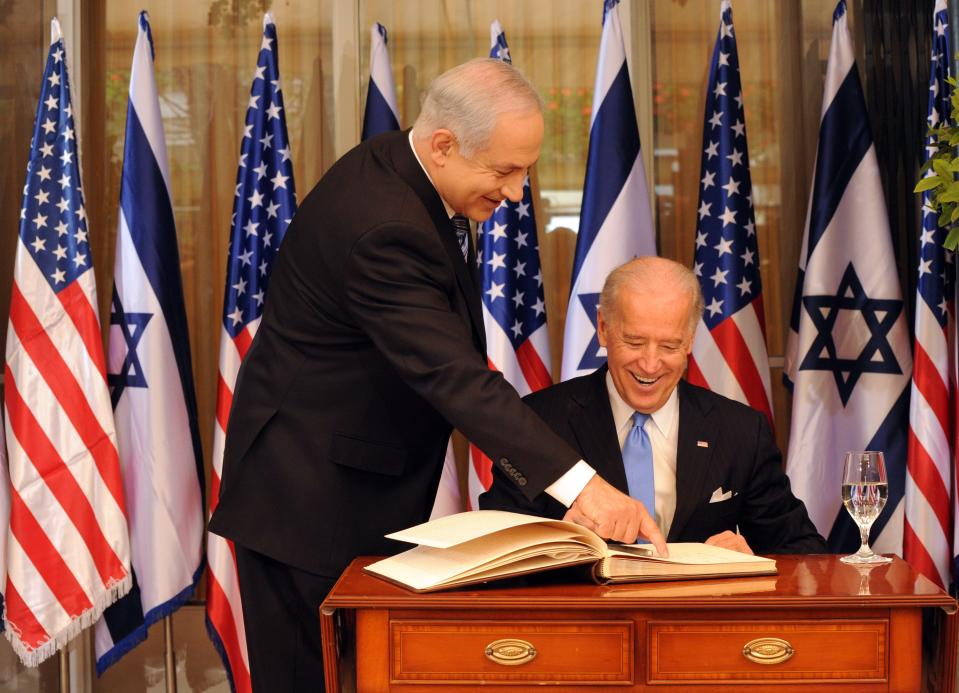From friendly to frosty, Biden and Netanyahu's decadeslong relationship tested by current crisis
WASHINGTON – In public, President Joe Biden and Israeli Prime Minister Benjamin Netanyahu like to tout their decadeslong relationship as warm and friendly.
But it’s no geopolitical bromance. Although the two men see eye-to-eye on the importance of the U.S.-Israel alliance, their rapport has been marked by awkward diplomatic slights and deep policy rifts.
Now it’s being tested anew as Biden tiptoes into the deadly Israel-Gaza conflict, some of the region's worst violence in years, and tries to exert American leverage to restore calm in the region.
"They are almost the antithesis of one another politically," said Khalil Jahshan, a Palestinian American political analyst and executive director of Arab Center Washington DC.
How the Biden-Netanyahu dynamic affects the current crisis, one of the most serious foreign policy challenges before the still-new administration, remains to be seen. Foreign policy experts say Israel cannot afford to ignore the White House's advice, even if Netanyahu bristles at U.S. intervention. But for now, Biden is not urging Israel to back off its military campaign against Hamas, despite pressure on the White House from progressives in the United States.
Jahshan said the two men do not trust one another, despite years of informal get-togethers and intense diplomatic dealings. Others say that's an overstatement but agree their relationship has evolved from friendly to frosty over the years, particularly during the Obama administration.
"There were moments of tensions, very serious tensions" during Barack Obama's presidency, said Nimrod Novik, a onetime foreign policy adviser to former Israeli Prime Minister Shimon Peres and now a fellow with the Israel Policy Forum, an organization that supports a two-state solution to the Israeli-Palestinian conflict.
A 'full scale war'? As crisis escalates, Biden administration dispatches envoy to Middle East
'Everybody knows I love Israel'
Biden and Netanyahu have known each other since the 1980s, their paths first crossing when Biden was a senator on the Foreign Relations Committee and Netanyahu was stationed at the U.S. Embassy in Washington and later at the United Nations.
At the time, Biden traveled to Israel frequently and cast himself a staunch supporter of Israel. He once boasted that he has known every Israeli prime minister since Golda Meir, who led the country in the early '70s. As is often the case with Biden, he has expressed his attachment to Israel in both political and emotional terms.
"Everybody knows I love Israel," Biden said at an annual Israeli Independence Day celebration in 2015. "You know me. You raised me. You educated me."

Novik and others say that Biden's relationship with Netanyahu changed as the Israeli leader moved further to the right and as the Obama administration pursued a nuclear agreement with Iran, Israel's biggest foe.
Biden and Netanyahu are both "wise enough to not let policy disagreements overshadow" their personal rapport, Novik said. But that was severely tested when Biden became vice president.
He recalled when Obama dispatched Biden to Israel in 2010, to help reassure Israeli leaders of the U.S. president's commitment to Israel's security. But the visit was upended when Israeli officials announced 1,600 new homes for Jewish settlers in a part of the West Bank, which U.S. officials saw as undermining Obama's hopes of reviving Israeli-Palestinian peace talks.
"The vice president was really offended and upset, and he made it known," Novik said. "The response was not shy."
Trump-Netanyahu: How two leaders reap political rewards from their cozy relationship
But nothing frayed U.S.-Israel relationships more than the 2015 nuclear deal forged by the Obama administration in concert with other world powers. Netanyahu blasted the deal and assiduously courted Republicans in Congress who opposed it. He even accepted an invitation to address a joint session of Congress – an event Biden notably skipped.
"Netanyahu had been so anti-Obama and had really ingratiated himself (with the GOP)," said Osamah Khalil, a Syracuse University history professor who specializes in Middle East affairs. "And the Republican Party itself wanted to use Netanyahu to criticize Obama in any way they could."
That dynamic almost certainly "grated" on Biden as he continued his dealings with Netanyahu, Khalil said.
'I don't agree with a damn thing you say'
Biden may have described the relationship best himself when he recalled signing a photograph for Netanyahu with this blunt note: "Bibi, I don't agree with a damn thing you say but I love you."
After the November election, Netanyahu was one of the first world leaders to phone Biden with a message of congratulations. "Joe, we’ve had a long & warm personal relationship for nearly 40 years, and I know you as a great friend of Israel," the prime minister posted in a Nov. 8 tweet.
Netanyahu's quick embrace of Biden was particularly noteworthy after the cozy relationship he developed with former President Donald Trump, which went far beyond political flattery and good chemistry. Trump upended many decades-old U.S. policies toward Israel, by moving the U.S. Embassy to Jerusalem, for example, and recognizing Israel's sovereignty over the Golan Heights.
Trump also withdrew the U.S. from the Iran deal and launched a campaign to isolate Tehran economically and politically – an approach that Netanyahu applauded.
Biden has moved quickly to try to revive the Iran deal, and he has restored some U.S. aid to the Palestinians that Trump nixed. Biden also signaled that he would not make the Israel-Palestinian conflict a major priority.
Novik said that was a calculated decision to "not fight Netanyahu on two fronts."
David Makovsky, a fellow at the Washington Institute for Near East Policy, said both Biden and Netanyahu are being careful not to reignite the tensions of the Obama years.
"I’m sure privately they’re very candid, but they’re very careful not to let that spill over" into public, he said.

US not pressuring Netanyahu – yet
He and others said that no matter how tense or amicable the Biden-Netanyahu relationship is, that will not be a major factor in how the U.S. navigates the current crisis.
During a phone call with Netanyahu on Wednesday, Biden's message for the Israeli leader was firmly supportive.
"Israel has a right to defend itself when you have thousands of rockets flying into your territory," the president said, recounting his conversation with Netanyahu.
Hamas, the militant Islamic group that controls Gaza, has fired hundreds of rockets into Israel in recent days. Israel has responded with a torrent of missile strikes. Seven people have been killed in Israel, including a soldier killed by an anti-tank missile and a 6-year-old child hit in a rocket attack. More than 80 Palestinians have died, including 17 children and seven women, according to Gaza’s Health Ministry, and another 480 Palestinians have been wounded.
Despite the lopsided death toll, Biden and his advisers have demurred when asked if Israel's military response has been disproportionate.
"There has not been a significant overreaction," Biden told reporters on Thursday. Secretary of State Antony Blinken also said Thursday that Hamas, which the U.S. considers a terrorist group, is "indiscriminately targeting civilians" while Israel is targeting the militant group's leaders and installations.
"I’m not sure the White House is spending a lot of energy looking for leverage right now," said Jon Alterman, director of the Middle East Program at the Center for Strategic and International Studies. "There's a certain willingness to sit back for a few days while Israel responds to attacks on civilians and defends itself."
He said the Biden administration will want to ensure Israel doesn't dig itself into a hole it can't get out of. But, he said, "I don't think we're quite at that point."
If Biden does begin to pressure Netanyahu to curb its actions in Gaza, Novik said Netanyahu will not be able to ignore it, even if he wants to, because the U.S. plays such an outsized role in Israel's security. And Biden will know just what to say to get Netanyahu's attention.
"He knows Netanyahu in and out," he said. "He knows all his schticks and tricks."

More:
This article originally appeared on USA TODAY: Biden and Netanyahu's decadeslong relationship tested by new crisis